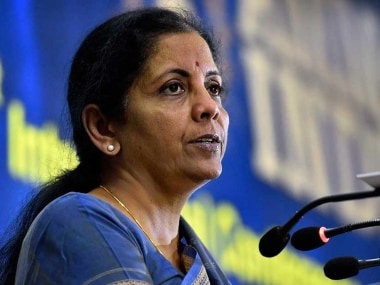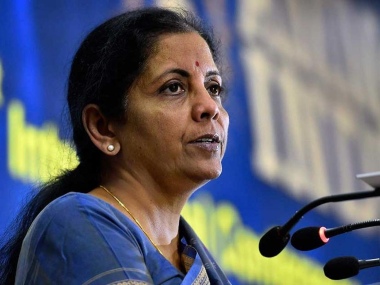The second week of May seems a game-changer for India. In 1998,the Pokhran II round of nuclear tests altered the country’s place in geopolitics. Can Prime Minister Narendra Modi’s Rs 20-lakh-crore package of measures announced 22 years later in the same week amid the COVID-19 pandemic crisis be a similar one for economics? That question is not easy to answer because it is full of ifs and buts that can be looked at through four prisms: fiscal prudence, social morality, political history and policy strategy. Each of these separately and collectively will shape outcomes in the coming months and years. [caption id=“attachment_7363111” align=“alignleft” width=“380”]  File image of finance minister Nirmala Sitharaman. PTI[/caption] Finance Minister Nirmala Sitharaman’s advisers have been speaking of why fiscal prudence is important to avoid India being downgraded from investment by global credit rating agencies, even as a galaxy of economists such as former chief economic adviser Kaushik Basu, Nobel laureate Abhijit Banerjee and former RBI governor Raghuram Rajan have been focusing more on upping the demand side — inviting criticism that the government is focusing more on the supply side. Economists estimate that Modi’s package totalling up to 10 percent of the GDP is barely 1 to 2 percent in terms of an increase in fiscal deficit at about Rs 2.1 lakh crore – with the remainder coming from loans, guarantees and Reserve Bank liquidity that do not cost the exchequer much. Such prudence, however, flies in the face of the accepted public morality of Garibi Hatao since former prime minister Indira Gandhi’s call at the start of the 1970s. The Janata Party in 1977 started its food-for-work programme. Manmohan Singh’s 1991 economic overhaul spoke a lot about ‘reforms with a human face’ while his graduation to the prime minister’s throne from the finance minister’s chair in 2004 brought in the Mahatma Gandhi National Rural Employment Guarantee Act to cushion rural wages. Sitharaman’s package seems to underplay the unwritten commandment of 50 years: ‘Thou shall secure the poorest of the poor.’ She, however, says there are many (including indirect) ways to transfer money to the poor. A break-up of her cash transfer schemes as part of a Rs 1.7-lakh crore PM Garib Kalyan Yojana outlay and the increased Rs 40,000 crore for MNREGA when tallied with an estimated 450 million informal sector workers or census estimates that put the migrant number at the same level, suggests the government may be on thin ice. Sitharaman has doubts on the data, but few will deny the magnitude of the problem. Moving visuals of migrant workers going hungry, their huddling in exploiter trucks and stories of deaths and misery on the highways after the pandemic are such that the government’s policies certainly go against the social morality of the past. Not since the Partition days of 1947 has India seen a painful demographic spectacle in large swathes of the country.
The government’s handouts total under Rs 500 per person a month for the poor who include low-end farmers, landless MNREGA workers and Jan Dhan Yojana beneficiaries. Is that enough in a crisis year considered substantially lost? And what happens to the services sector jobs that go blank in a health crisis? That is where social morality critics seem to have an upper hand.
That brings us to how historians may view the package. Strangely, and bizarrely for some, the slew of reforms in the 4L package – land, labour, law and liquidity – seem to have a top-down slant in a bottom-up polity. The Narendra Modi government may face charges of heartlessness or Tuglakhian arbitrariness, especially when you consider the fact that under the label of an Atma Nirbhar Bharat Abhiyan (self-reliance movement), there is a slew of open-door policies for foreign investors and private entrepreneurs in everything from agriculture to coal mining and outer space. Yet, there could be a strategy behind all this. To understand this, you have to look at things from the government’s viewpoint. If fiscal prudence is essential to maintain sovereign credit ratings at a healthy level, it logically follows that positive benefits can accrue from foreign investment inflows. Two of the government’s key reformist aides have been outspoken on this issue. While Principal Economic Adviser Sanjeev Sanyal (a former international banker) speaks of a 1991-style ‘reset’, Chief Economic Adviser Krishnamurthy Subramanian (a business school professor) speaks of raising as much as $60 billion by listing government bonds overseas. At Rs 4.5 lakh crore, that is a lot of money!
In the end-game scenario envisaged by these two gentlemen, foreign money should pour in like manna from heaven, thanks to fiscal prudence and economic glasnost. Is that a growth gamble in times of coronavirus, like love in the times of cholera – a magnificent Marquezian obsession with an economically muscular India? This much is clear: foreign money has to more than shower on Indian soil for the strategy to work. It has to seep into the pores through which hundreds of millions of physical labourers sweat and slog. On the other hand, there is a rain check that the government can wield yet.
Given that the lockdown necessitated by the COVID-19 pandemic is still dragging, we are months away anyway from real spending in an economy in which social distancing, masks and uncertainties will rule in the foreseeable future. In that sense, options are still open for Sitharaman to open her khata-book to unfurl a higher fiscal deficit to feed some mouths and silence some others.
Sitharaman’s options include infusing a fresh round of capital to strengthen public sector banks – which would fuel credit growth – or pumping up state spending on the poor. We cannot simply assume that the government has played all its fiscal cards when the financial year has just begun. There is elbow room for more spending through a mini-budget that could come through demands for supplementary grants in the Lok Sabha. Or there could be new initiatives including bond issues or listings. They may be simply announced one Friday afternoon in a press conference by a minister who has held five in as many days over the past week. But this much is clear. The jury will be out in the coming days. The gamble is such that failure is simply not affordable. (The writer is a senior journalist and commentator. He tweets as @madversity)


)

)
)
)
)
)
)
)
)



